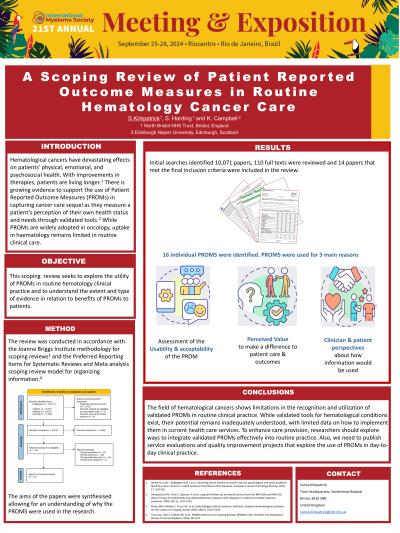Nursing Symposium
Poster Session 2
NSP-07: Patient Reported Outcome Measures in Routine Haematology Cancer Care: A Scoping Review
Thursday, September 26, 2024
Location: Exhibit Hall, Pavilion 3


Suriya kirkpatrick, Registered Nurse, MSc, Ba (Psychology) (she/her/hers)
Advanced Research Nurse Practitioner - Haematology
North Bristol NHS Trust
Bristol, England, United Kingdom
Introduction:
Background: Haematological cancers can have devastating effects on patients’ physical, emotional, and psychosocial health. With improvements in therapies, patients are living longer. There is growing evidence to support the use of Patient Reported Outcome Measures (PROMs) in capturing cancer care sequel as they measure a patient’s perception of their own health status and needs through validated tools. While PROMs are widely adopted in oncology, it is felt that uptake in haematology remains limited in routine clinical care.
Objective: This scoping review seeks to explore and identify the utility of PROMs in routine haematology clinical practice and to understand the extent and type of evidence in relation to benefits of PROMs to patients.
Methods: This review was conducted in accordance with the Joanna Briggs Institute methodology for scoping reviews and the Preferred Reporting Items for Systematic Reviews and Meta analysis scoping review model for organising information.
Results: Initial searches identified 10,071 papers, 110 full texts were reviewed and 14 papers that met the final inclusion criteria were included in the review. Over 20 individual outcome measures were identified that fell into the following categories: accessibility and usability, self-efficacy, shared decision making and implementation.
Conclusions: The studies focused on the perceived benefits of adopting PROMs within routine haematology care: the choice of PROM, acceptability and usability, motivation for use, patient and health care professionals’ experience of using PROMs, the stated value of the PROM and implementation advice. However, there are limited published studies supporting how PROMs can be meaningfully adopted into the routine care for people with haematological cancer to impact clinical and patient outcomes.
Implications for Practice: While numerous validated PROMs exist, there is a pressing need for the application of implementation science methodologies in integrating PROMs into routine care for hematologic cancer patients, to enhance the quality of care delivered.
Background: Haematological cancers can have devastating effects on patients’ physical, emotional, and psychosocial health. With improvements in therapies, patients are living longer. There is growing evidence to support the use of Patient Reported Outcome Measures (PROMs) in capturing cancer care sequel as they measure a patient’s perception of their own health status and needs through validated tools. While PROMs are widely adopted in oncology, it is felt that uptake in haematology remains limited in routine clinical care.
Objective: This scoping review seeks to explore and identify the utility of PROMs in routine haematology clinical practice and to understand the extent and type of evidence in relation to benefits of PROMs to patients.
Methods: This review was conducted in accordance with the Joanna Briggs Institute methodology for scoping reviews and the Preferred Reporting Items for Systematic Reviews and Meta analysis scoping review model for organising information.
Results: Initial searches identified 10,071 papers, 110 full texts were reviewed and 14 papers that met the final inclusion criteria were included in the review. Over 20 individual outcome measures were identified that fell into the following categories: accessibility and usability, self-efficacy, shared decision making and implementation.
Conclusions: The studies focused on the perceived benefits of adopting PROMs within routine haematology care: the choice of PROM, acceptability and usability, motivation for use, patient and health care professionals’ experience of using PROMs, the stated value of the PROM and implementation advice. However, there are limited published studies supporting how PROMs can be meaningfully adopted into the routine care for people with haematological cancer to impact clinical and patient outcomes.
Implications for Practice: While numerous validated PROMs exist, there is a pressing need for the application of implementation science methodologies in integrating PROMs into routine care for hematologic cancer patients, to enhance the quality of care delivered.